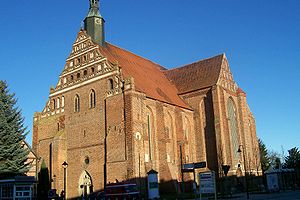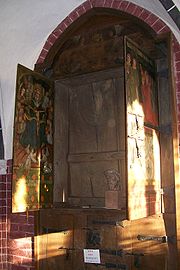
Holy Blood of Wilsnack
Encyclopedia


Pilgrimage
A pilgrimage is a journey or search of great moral or spiritual significance. Typically, it is a journey to a shrine or other location of importance to a person's beliefs and faith...
s to Bad Wilsnack
Bad Wilsnack
Bad Wilsnack is a town in the Prignitz district, in Brandenburg, Germany. It is situated halfway between Berlin and Hamburg. Since 1928 it has been officially recognised as a spa town, before which time its name was simply Wilsnack...
, Germany
Germany
Germany , officially the Federal Republic of Germany , is a federal parliamentary republic in Europe. The country consists of 16 states while the capital and largest city is Berlin. Germany covers an area of 357,021 km2 and has a largely temperate seasonal climate...
for nearly two centuries. Revenue from the many pilgrims enabled the town to build the large St. Nikolai Church (also known as Holy Blood Church) at the site. The hosts were destroyed by reformers in 1558 during the Protestant Reformation
Protestant Reformation
The Protestant Reformation was a 16th-century split within Western Christianity initiated by Martin Luther, John Calvin and other early Protestants. The efforts of the self-described "reformers", who objected to the doctrines, rituals and ecclesiastical structure of the Roman Catholic Church, led...
.
History
In 1383 a quarrel broke out between one of the knights of the PrignitzPrignitz
Prignitz is a Kreis in the northwestern part of Brandenburg, Germany. Neighboring are the district Ludwigslust-Parchim in Mecklenburg-Western Pomerania, the district Ostprignitz-Ruppin in Brandenburg, the district Stendal in Saxony-Anhalt and the district Lüchow-Dannenberg in Lower...
, Heinrich von Bülow
Heinrich von Bülow (Grotekop)
Heinrich von Bülow also known as Big Top was a knight born in the middle of the fourteenth century. He died either before 1395 or during 1415. He prospered as a warrior- supporter of Prince Albrecht of Mecklenburg...
, known as "Big Head", and the Bishop of Havelberg, Dietrich Man
Dietrich Man
Dietrich Man, known as Dietrich II, was Bishop of Havelberg from 1370 to 1385.The Man family, though not noble, were prominent in the Prignitz, which lay within the Diocese of Havelberg, and closely connected with the local nobility. Dietrich's grandfather Johann Man married, first, a widow of Ivan...
. Von Bülow raided Wilsnack, one of the bishopric's villages, and burned it to the ground. Entering the ruins of his church, the parish priest found that in the Sacrarium on the altar were three consecrated hosts. They were untouched by the fire but stained with blood. Bishop Dietrich acted to consecrate the hosts so as to avoid accidental idolatry, but the central one overflowed with blood before he could pronounce the Words of Consecration.
They became objects of veneration, and miracles began to be attributed to them. So many pilgrims came that they rivaled the numbers of those to Santiago de Compostela
Santiago de Compostela
Santiago de Compostela is the capital of the autonomous community of Galicia, Spain.The city's Cathedral is the destination today, as it has been throughout history, of the important 9th century medieval pilgrimage route, the Way of St. James...
. The revenue the pilgrims generated enabled the diocese to build the church of St. Nicholas. Pilgrims paid for tokens made in the shape of three hosts, which they presented as offerings. Archeologists in the area continued to find examples of such artifacts. Some contemporary religious figures criticized the veneration of the hosts, on the grounds that they were fraudulent, or that veneration was theologically unsound as undermining the concept of Christ's glorification in heaven. (This meant that no blood of his could appear on Earth. The appearance of the hosts was also considered to undermine the traditional doctrine of transubstantiation
Transubstantiation
In Roman Catholic theology, transubstantiation means the change, in the Eucharist, of the substance of wheat bread and grape wine into the substance of the Body and Blood, respectively, of Jesus, while all that is accessible to the senses remains as before.The Eastern Orthodox...
.) Controversy continued for more than a century.
Among the pilgrims to the site was the English mystic
Mysticism
Mysticism is the knowledge of, and especially the personal experience of, states of consciousness, i.e. levels of being, beyond normal human perception, including experience and even communion with a supreme being.-Classical origins:...
Margery Kempe
Margery Kempe
Margery Kempe is known for dictating The Book of Margery Kempe, a work considered by some to be the first autobiography in the English language. This book chronicles, to some extent, her extensive pilgrimages to various holy sites in Europe and Asia, as well as her mystical conversations with God...
in 1433, who referred to the visit in her The Book of Margery Kempe. In the 15th century, the Bishop of Havelberg and the Archbishop of Magdeburg
Archbishopric of Magdeburg
The Archbishopric of Magdeburg was a Roman Catholic archdiocese and Prince-Bishopric of the Holy Roman Empire centered on the city of Magdeburg on the Elbe River....
mutually excommunicated each other over the controversial issue of the hosts. The "holy blood" of Wilsnack was attacked by the reformer Jan Hus
Jan Hus
Jan Hus , often referred to in English as John Hus or John Huss, was a Czech priest, philosopher, reformer, and master at Charles University in Prague...
and the University of Erfurt
University of Erfurt
The University of Erfurt is a public university located in Erfurt, Germany. Originally founded in 1379, the university was closed in 1816 for the next 177 years...
. Cardinal Nicholas of Cusa
Nicholas of Cusa
Nicholas of Kues , also referred to as Nicolaus Cusanus and Nicholas of Cusa, was a cardinal of the Catholic Church from Germany , a philosopher, theologian, jurist, mathematician, and an astronomer. He is widely considered one of the great geniuses and polymaths of the 15th century...
tried to forbid pilgrimages there. Pope Eugene IV compromised by requiring that a freshly consecrated host be displayed alongside the relics. The common people persisted in making pilgrimages to see the hosts, which were important objects of devotion until destroyed by Protestant reformers
Protestant Reformation
The Protestant Reformation was a 16th-century split within Western Christianity initiated by Martin Luther, John Calvin and other early Protestants. The efforts of the self-described "reformers", who objected to the doctrines, rituals and ecclesiastical structure of the Roman Catholic Church, led...
in 1558.

